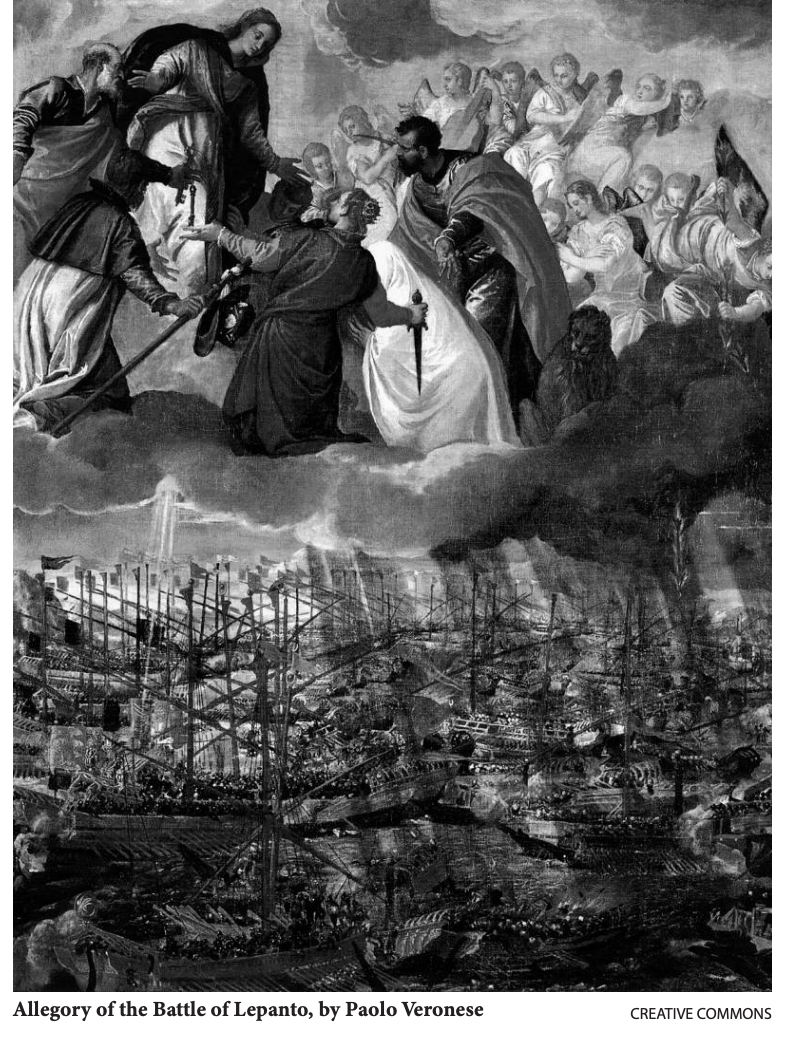On Tuesday, October 7, 2025, the Church celebrated the Feast of Our Lady of the Rosary. Originally called the Feast of Our Lady of Victory, this feast was instituted by Pope Saint Pius V after the Christian defeat of the Turks at the Battle of Lepanto. During the precarious late Sixteenth Century, Christendom was besieged on many fronts. Firstly, the Protestant Reformation had torn the unity of the Christian West asunder and ignited the flame of many religious and political conflicts across Europe. By 1570, the Catholic Church (namely in the person of the Holy Roman Emperor) had completely given up on the hope that certain lands would revert back to the Church. The Peace of Augsburg (1555) ensured that each ruler within the Holy Roman Empire could impose their own views upon their subjects, a doctrine known as cujus regio, ejus religio (“Whose realm, his religion”). Thus, certain duchies, principalities, landgraviates, and other various political entities, such as Saxony and Hesse were now safely Protestant. The other large threat against Christendom at that time came from outside of the Christian fold, namely from the Turkish Muslims in the East. A zealously religious group and a well organized military force, the Turks were a serious threat to the West. About a decade before the implementation of this feast, the Habsburg ambassador Ogier Ghiselin de Busbecq wrote to the emperor about the strict temperament of the Turks and their organization and discipline, something which the armies of the West lacked. As the Ottomans made advances in the Balkans and increasingly became a threat to the West in central Europe and especially in the Mediterranean, the Pope assembled the Holy League in 1570, composed of several members (Papal States, the Spanish Empire, as well as several Italian republics and duchies). This league, drawn from various political entities that had been former rivals, was dispatched as a defense against the Ottoman Empire in the hopes of saving Christendom. After the fall of Cyprus and the brutal treatment of the Christians by the Ottoman subjugators, the Holy League became zealous in its determination to beat the Ottoman forces. This opportunity came at Lepanto in October 1571. Prior to the victory, Pope St. Pius V had encouraged all Catholics to offer up the Rosary for a league victory, thus entrusting the survival of Western Civilization to the Blessed Mother. On October 7, 1571, the Holy League surprisingly beat the Ottoman Empire at Lepanto in the Gulf of Patras, dealing a massive blow to further Ottoman imperial ambitions and reinvigorating the Catholic world. To honor Mary for her intercession the pope instituted the Feast of Our Lady of Victory, which eventually has come to be known as Our Lady of the Rosary. Yet, it is important to note the broader importance of this feast, which cannot be dismissed as a feast rooted in some arcane historical reference. This feast is a reminder to all Catholics of the importance of the Rosary. It is also an important reminder of how we have not stopped doing battle. While we are not fighting the Ottoman Empire anymore, we are instead fighting against the empire of secularism and atheism, which are far more insidious than the Ottomans. Today we fight against the scourge of abortion, the insanity of transgenderism, and the ever-increasing materialistic urge to see everything as expendable. In these difficult waters too, Our Lady can sustain us and bring us victory over the forces of evil. Since 1571, the Church has seen many losses in the West. France, once known as the “Eldest daughter of the Church” has become the progenitor of revolution and atheism. The once-Catholic Spain has become a nation dominated by liberalism. Even the small and ardently Catholic nation of Andorra (ruled by two co-princes, one of which is the Catholic Bishop of Urgell) is moving towards liberal abortion laws. However, all hope is not lost for those of us who still count ourselves as children of the Holy Mother Church. As in times of old, Our Lady will intercede for us in both our personal lives and for the return of whole peoples back to the sweet yoke of her Son. In the words of the ancient Catholic prayer The Memorare, “Never was it known that anyone who fled to thy protection, implored thy help, or sought thy intercession was left unaided.” Our Lady of Victory, ora pro nobis!
Our Lady of the Rosary
Mac Connors, Crier Staff
October 9, 2025
Story continues below advertisement
0


